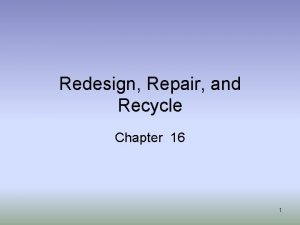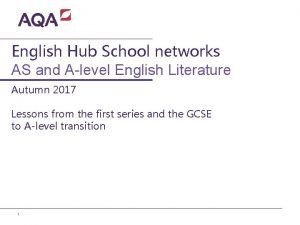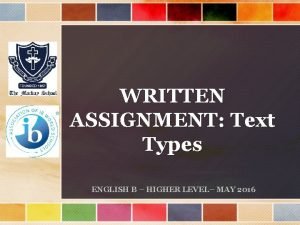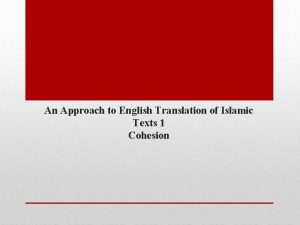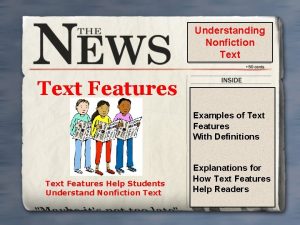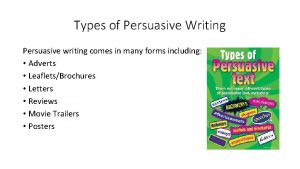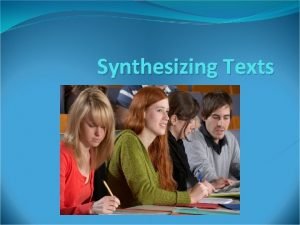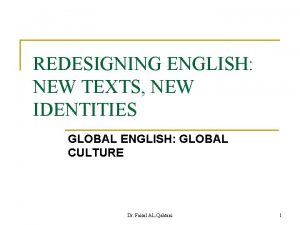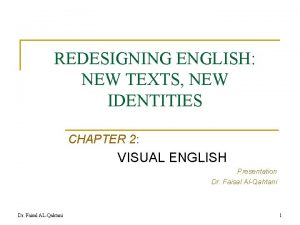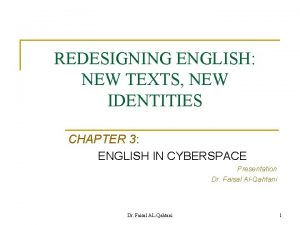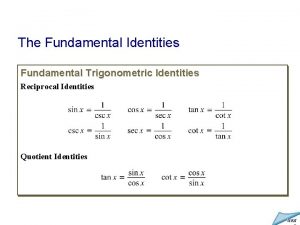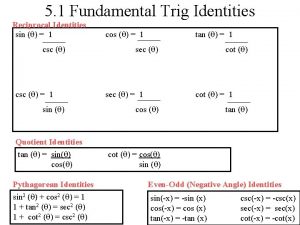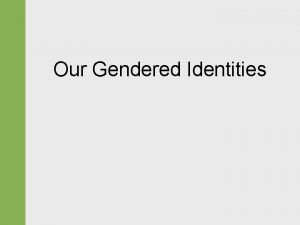REDESIGNING ENGLISH NEW TEXTS NEW IDENTITIES ENGLISH IN










- Slides: 10

REDESIGNING ENGLISH: NEW TEXTS, NEW IDENTITIES ENGLISH IN CYBERSPACE Dr. Faisal AL-Qahtani 1

INTRODUCTION n Focus: ¨ ¨ ¨ The role of English in cyberspace. The novel ways in which English is used in cyberspace. The new social groups and social relationships created through Internet communication. n ¨ The Internet: n ¨ Cyberspace: The imaginary space created by the Internet both a technological and a social phenomenon. Forms of Communication on the Internet: n n Electronic mail (e-mail) World Wide Web pages. Dr. Faisal AL-Qahtani 2

The social Implications of the Internet ¨ Major expansion in global communication. n n n Such a new pattern of communication has transformed with it the quality of human relationships. Has wider and unclear political and cultural implications. Constructing different social identities: ¨ ¨ n Real identity is unknown. engagement in diverse cultural practices. Internet is a complex technological innovation which may lead to wide social and political change both positive and negative. Dr. Faisal AL-Qahtani 3

ENGLISH AND THE INTERNET: n Three main issues: ¨ ¨ The internet supports and encourages the use of English more than other languages. The political and cultural dominance by Englishspeaking countries of the key global communication technology: n ¨ USA dominance in computer hardware and software development and in the creation of the Internet has led to the global expansion of English into cyberspace. The extent to which English itself is changing as a result of its use on the Internet. Dr. Faisal AL-Qahtani 4

NEW TEXTS: NEW GENRES ¨ the texts: n n n do not display the characteristics of traditional print genres. Spontaneous and informal: spoken rather than written language style. The potentials of electronic media: ¨ ¨ n n construct more fluid and dynamic texts reflect the new social relationships between participants in Internet communication. Multi-modal texts (picture, text, sound) are encoded at one end and transmitted to a recipient anywhere in the world where it is decoded. Dr. Faisal AL-Qahtani 5

Features of Electronic Texts n Economies of Communication ¨ Use n of various forms of electronic text: Dynamic and Multidimensional texts: ¨ Hypertexts: § documents are no longer linear and fixed but multidimensional and dynamic. ¨ Synchronous and asynchronous mode of communication. Dr. Faisal AL-Qahtani 6

Effect of E-Texts on Language Use n Language Change: ¨ Unification (centripetal forces) ¨ Diversification (centrifugal force) ¨ The technology of print and writing have unified language use by providing fixity. n Electronic Communication: ¨A threat to the fixity of print: A continuous changing form n More like speech in its clause structures n Dr. Faisal AL-Qahtani 7

NEW TEXTS, NEW SUBJECTIVITY n Electronic texts and social identity: ¨ Who is speaking in an e-texts? n New forms of English language allow individuals to construct new subjectivities and identities. ¨ n Subjectivity: one’s sense of self and perception of relationships to others. Lack of physical location and presence ¨ affects the way in which participants perceive and present themselves. Dr. Faisal AL-Qahtani 8

IMAGINED COMMUNITIES n n How can the technologies of writing and reading affect our perceptions of the world and ourselves? Nationality: ¨ To imagine oneself as part of a community and this can be only imagined if the language and the media of power, and print provide a fixed linguistic and ideological basis. Dr. Faisal AL-Qahtani 9

Doing Nationality on-line: n National Identity and the English language: ¨ n Internet users may express their national or even regional identities through the English language. The Internet may remove “imagined communities” of nationalism ¨ in favor of other communities based either upon n n global economic ideologies or patterns of personal interest and opinion. Dr. Faisal AL-Qahtani 10
 Redesigning office space
Redesigning office space Redesigning the organization with information systems
Redesigning the organization with information systems Redesigning old clothes
Redesigning old clothes Nea prohibited texts
Nea prohibited texts Pamphlet text type
Pamphlet text type An approach to english translation of islamic texts
An approach to english translation of islamic texts Ib themes english
Ib themes english Nonfiction text examples
Nonfiction text examples Types of persuasive writing
Types of persuasive writing Definition of synthesis
Definition of synthesis Reported speech text examples
Reported speech text examples


